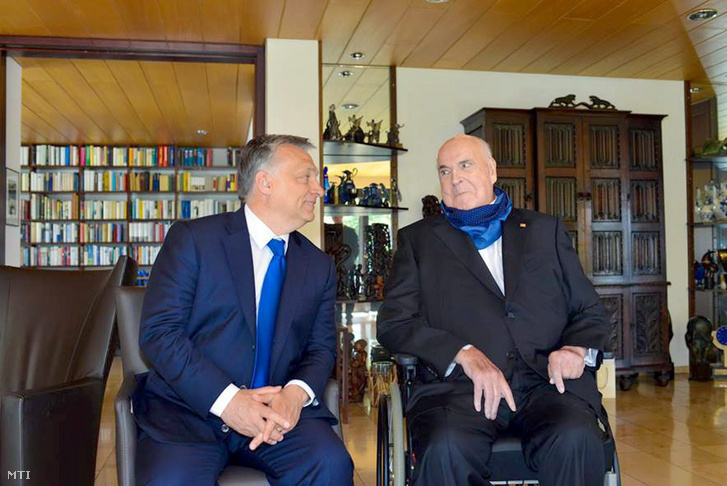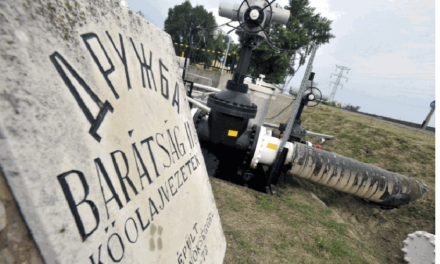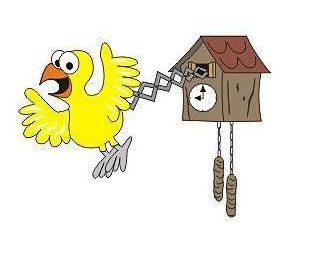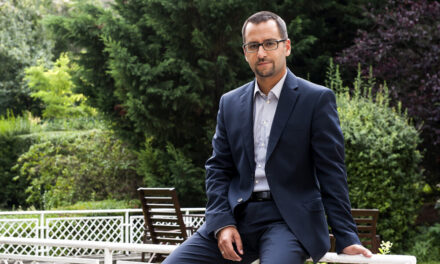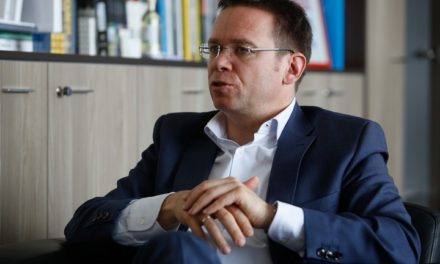We now know that the exhortations of Helmut Kohl, the former German chancellor, fell on deaf ears, as he also wrote: the West, Russia and Ukraine must equally take care not to squander everything they have already achieved, everyone must add their own.
There are books that are not enough to read once. Years may pass, but they lose none of their relevance, we can take them in our hands again and again to get answers and find solutions to the big questions and challenges of the present. This is exactly why it is worth taking off the bookshelf the first chancellor of reunified Germany's worried call for Europe.
Six years ago, in 2016, the József Antall Knowledge Center published a Hungarian translation of Christian Democrat Helmut Kohl's 2014 Concern for Europe . died in 2017 at the age of 87 , but his appeal still serves as valid admonitions and lessons for Europe.
Born in 1930, Kohl belonged to the generation that experienced World War II. the devastating years of World War II (he was conscripted, but he no longer went to the front, but his brother lost his life in the war), then he saw with his own eyes the ruins left after the war that claimed the lives of millions of people, the bloodied Europe, and then the lowering of the Iron Curtain that divided Germany and the continent. All these experiences determined his thinking and political path until the end of his life, he became a forge of German and European unity, which he considered the main, unquestionable pillar of peace.
Today, cracks in European unity are multiplying, division threatens the future of the European Union, peace has been dealt a blow, the Russian-Ukrainian war threatens the entire continent, but its effects go far beyond that. On August 24, it was six months since the war in Ukraine began, a day earlier, on August 23, the victims of totalitarian dictatorships - Nazism and Communism - were remembered in Europe. On this day in 1939, the Molotov-Ribbentrop Pact was signed, which marked the end of World War II. it was the anteroom for the outbreak of World War II. The past serves as a warning for the present: the XX. In the first half of the 20th century, wars caused suffering and destroyed a large part of Europe, the idea of unity that took shape after 1945 – first in Western Europe, and then in Europe after the fall of the Iron Curtain – was born in part to ensure the peace of the continent.
Helmut Kohl's essay written in 2014 is a stand for peace and European unity, as well as a warning that neither is taken for granted, both are fragile, and hard work and sometimes compromises must be made to preserve them.
Europe was unprepared
In 2016, Index wrote At that time, the most pressing challenge facing the continent was migration, so Kohl's treatises on this matter received more emphasis. The fact that Viktor Orbán and Helmut Kohl maintained a friendly relationship was not an incidental fact either, because the Hungarian government took a strong and decisive position (and still does today) on the topic of migration. What's more, the Hungarian prime minister wrote the introduction to the Hungarian publication of the former German chancellor's essay.
In his foreword dated March 2016, Kohl put it this way: in many respects, the period when Europe and the entire freedom-oriented West did not take notice of the events taking place in the world and misjudged some of them lasted too long. He also stated that, with foresight, the huge wave of refugees at the time could have been avoided.
"This wave should not have been allowed to hit Europe so unprepared. We underestimated the impact of the first wave of refugees on Europe, and we did not realize that solving it was also a task for Europe."
- wrote the former German chancellor.
What he explained about the tasks and solutions facing Europe are in line with the position of Viktor Orbán and the Hungarian government. Kohl drew attention to the fact that, first of all, the root causes of the flight must be eliminated, even locally, so that people can once again have a vision of the future in their own country.
The latter also means that solutions must be found in the affected regions themselves, not in Europe. Europe cannot become the new home of millions of people in need around the world
he added.
These sentences can also be found in Viktor Orbán's speeches in recent years. In addition, Kohl's dissertation - reinforcing the position of the Hungarian Prime Minister - went against German Chancellor Angela Merkel's Willkommens policy.
Merkel, who has now left the chancellorship, was just recently awarded the Félix Houphouët-Boigny-UNESCO Peace Prize for her efforts to welcome refugees. According to the official statement, all members of the jury were moved by the former chancellor's "courageous decision" in 2015 for Germany to accept more than 1.2 million refugees. It is true that Merkel's immigration policy gradually lost its Willkommens character by the time she reached the end of her term in office.
A common journey instead of a separate journey
The relationship between Merkel and Kohl was not harmonious even without the refugee issue. For a long time, Merkel built her political career under Kohl's wing in the Christian Democratic Union (CDU). portrait article about Merkel , Kohl first called her his little girl (Mädchen), and later his assassin.
They agreed that a common European response to the refugee issue is needed. In the preface to his 2016 essay, Kohl stated: the refugee issue must be followed on a common European path, the solution must be experienced as a common task, and Europe needs more than anything to revive its common values and common goals, more cooperation instead of opposition, more trust instead of mistrust need.
Where the diagnosis of Helmut Kohl and Viktor Orbán differed is that the former German chancellor strongly argued against separate travel, which has become a feature of the Hungarian government in European politics that has become the subject of fierce debates since the outbreak of the migration crisis - although there are also followers and allies.
We have to leave the decisions made alone - no matter how well-founded they may seem to some people - and separate national politicking. In the Europe of the twenty-first century, these can no longer be among the alternatives that can be chosen, especially since the consequences of the decisions must usually be shared by the European community. This is particularly valid in view of the ever closer interdependence and interdependencies that are developing on our continent
– reads Kohl's admonition.
At the same time, regarding the debates about the future of the European Union, it is possible to once again be placed on a common platform with the Hungarian Prime Minister who rejects the United States of Europe. Although Kohl was a committed supporter of ever-closer European unity, and despite the omissions, errors and shortcomings he named, he did not give up on this, he made it clear:
Europe should not become some kind of centralized state, a European superstate, but should rather rest on federal foundations.
"We want a Europe of nations"
The former German chancellor explained: European unification is the most effective defense against falling back to the 19th century. into the harmful chauvinism of the 20th century. A return to the old, nation-state thinking would endanger peace and freedom. But he admitted that the term "United States of Europe", which he also used fondly, was ambiguous and caused wrong associations and fears.
We just don't want something like the United States of America on European soil
he noted. Kohl then described at length what he meant by European unity: it does not mean some kind of European uniformity, but a Europe that respects the sense of identity and culture of all member states and regions, and follows the principle of subsidiarity.
"We are building a Europe that never loses sight of the fact that citizens do not tolerate Europe, but represent it. We want a Europe that is open and tolerant towards dissenters and followers of other religions, but remains based on our great Western tradition. (…) Primarily, the totality of European cultural heritage is the spiritual foundation on which we stand: the philosophy of antiquity, humanism, the ideas of the Enlightenment and the power of Christianity. We want a Europe of nations - as French President Charles de Gaulle once put it - in a united Europe, where we are all Europeans, but in the meantime we also preserve our own national identity. In other words, we want to remain Germans, Italians, French, Dutch, Poles or Hungarians, to name just a few nations, while at the same time being European," wrote Kohl.
The former German chancellor defined as a goal that the foundations of Europe must be strengthened, that the process of European unification must be continued and made politically irreversible. And he called it a fundamental principle that Europe should stick closely to the United States of America. Disagreements and differences of opinion may occur, but this is normal, it is part of friendship, there is "no alternative" to a solid partnership and friendship with the United States of America.
He drew attention to the fact that close cooperation is of fundamental importance for both parties, considering the challenges outside Europe and America, because "we can only win the future together".
There is no peace without Russia
Eight years after writing Concern for Europe, it is particularly worth rereading what he wrote about the relationship between the West and Russia, and the Russian-Ukrainian conflict. Kohl put his thoughts on paper in 2014, when Moscow annexed the Crimean peninsula back to Russia.
"Peace is indivisible", wrote the former German chancellor in his essay eight years ago, who believed that there can be lasting peace in Europe only if all its inhabitants live in peace with each other. The formation of a stable European security order is therefore also a prerequisite for the involvement of Russia.
Kohl warned that Russia, which historically and culturally belongs to Europe, is the largest state on the continent, the most important partner of the European Union, and one of the most powerful countries on Earth, so what happens there and what doesn't happen affects the whole world and all of us. Therefore, positive development in Russia and good, peaceful cooperation in the region that makes up its neighboring states, as well as in the tripartite relationship between Russia, the European Union and NATO, is in everyone's interest.
He explained in detail what efforts were made for peaceful cooperation with Russia after the collapse of the Soviet Union. In Europe, they were aware that the eastward expansion of NATO and the European Union fundamentally affects Russia's security policy interests, and its sensitivity must be taken into account if they do not want to risk the development of unnecessary tension.
Still, a quiet estrangement began between the West and Russia, resulting in tension that escalated in the conflict over Ukraine and Crimea.
In addition to the way Russia is behaving in the situation in Ukraine, of course the West cannot leave without saying a word, but the West should have handled the Russian side more wisely. Mistakes were made on both sides and they clearly did not care enough about the sensitivities of the other side
Kohl explained.
Today we know that his admonition fell on deaf ears, as he also wrote: the West, Russia and Ukraine must also take care not to squander everything they have already achieved, everyone must add their own.
There is a need for a peaceful solution that will suit all parties involved, while also respecting the right of nations to self-determination. However, you really have to want this solution, and this can best be achieved if people talk to each other
- the former German chancellor outlined his vision.
Who is building the future?
His conclusion is what he has been constantly insisting throughout his essay: the preservation and further deepening of European unity; put political union back on the agenda of the European Union; Community building must be continued in the fields of foreign and security policy, defense policy and economic policy. He assessed the historic chance for the unfinished Europe to move forward as only a temporary opportunity, which is "not a permanent invitation to dance".
The final point of Kohl's essay is that the stakes are huge: our future; and "our future is called Europe". The only question is whether there are builders for this future, leaders in Europe with the size, commitment and long-term vision of the European future comparable to the former German chancellor. And of course, who are those in European politics who will still take out Helmut Kohl's essay when unity is already division and war is back on the continent?
German Christian Democrat politician Helmut Kohl was born on April 3, 1930 in Ludwigshafen. He was Chancellor of the Federal Republic of Germany from 1982 to 1998. The first chancellor of Germany, which was reunited in 1990. In 1998, he received the title of Honorary Citizen of Europe for his extraordinary work for European integration and cooperation. He died in 2017, a year later Viktor Orbán eulogized him as follows:
"It is no exaggeration to say that Helmut Kohl was a gift of providence to Germany and Europe. For us Central Europeans, Helmut Kohl is the ideal of a Christian European."
Prime Minister Viktor Orbán visits former German Chancellor Helmut Kohl (j) at his home in Oggersheim on April 19, 2016. Photo: Daniel Biskup / MTI

